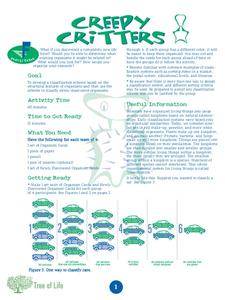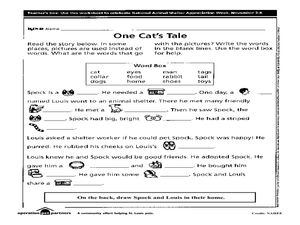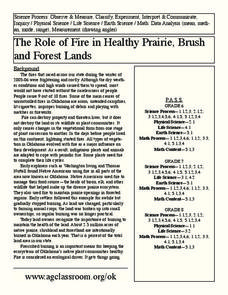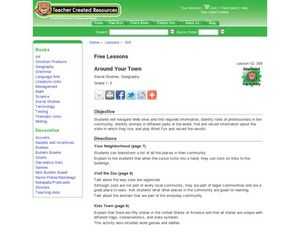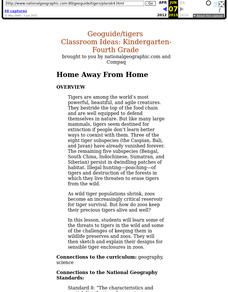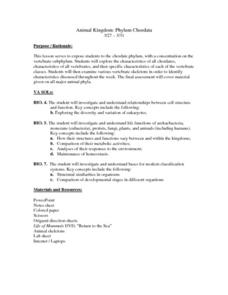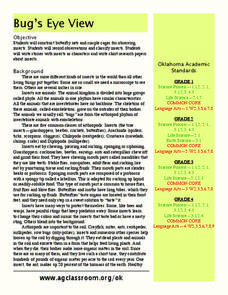Curated OER
Creepy Critters
Students classify imaginary newly discovered organisms. In this classification lesson plan, students are given cards showing imaginary organisms that have been recently discovered. They must classify the organisms based on their...
Curated OER
Plankton
Students explore the attributes of plankton. In this plankton lesson plan, students read This is the Sea That Feeds Us and discuss food chains. Students discover the differences between phytoplankton and zooplankton as they examine the...
Curated OER
Fascinating Creatures
Sixth graders explore the characteristics of mythological creatures. In this mythology activity, 6th graders use print and Internet sources to define and classify mythological creatures, such as Centaur, Cerberus, Chimera, Cyclops,...
Curated OER
Fabulous Felines: How to Choose the Purrfect Cat
Students investigate the concept of pet care and cats. In this cat lesson, students discuss responsibilities for pet care and take a cat quiz. Students discuss where to get their cats and how to care for them. Students may visit an...
Curated OER
Whose Brain is THAT?!
Students explore various animal brains. In this animal anatomy lesson, students compare and contrast animal brains with the brain of a human. They record several characteristics in a data table for each brain they observe.
Curated OER
The Role of Fire in Healthy Prairie, Brush and Forest Lands
Students create a Venn diagram to compare and contrast wildfires and prescribed fires. In this earth science lesson plan, students conduct a series of experiment to explore fire characteristics. They describe favorable conditions to...
Curated OER
Echinoderms and Chordates
In this biology worksheet, students complete a crossword puzzle with 20 questions on echinoderms and chordates characteristics and features.
Curated OER
Intermediate Guided Reading Lesson Plan
Students read Knots on a Counting Rope, by Bill Martin Jr. and John Archambault. In this guided reading instructional activity, students evaluate the characteristics of a realistic fiction piece. They are asked comprehension questions...
Curated OER
Viruses Quiz
In this science activity, students will test their knowledge of viruses. Students answer ten multiple choice questions pertaining to virus characteristics.
Curated OER
Frogs
In this frogs worksheet, students read and study the 5 main characteristics that all frogs have. Students color a large picture of a frog.
Out of Africa Wildlife Park
A Thematic Learning Guide to Lions
Written as an accompaniment to a field trip to the Out of Africa Wildlife Park in Arizona, this is an interdisciplinary, themed lesson on lions. Even if you cannot take your upper-elementary kids to this attraction, there are a few...
Curated OER
Animal and Plant Habitats
Second graders write and illustrate a story. In this habitats lesson, 2nd graders learn about different types of plant and animal habitats. Students view video segments about habitats, answer comprehension questions, complete a crossword...
Curated OER
Australian Mammals: Evolutionary Development as a Result of Geographic Isolation
Learners comprehend the difference between monotremes, marsupials, and placental mammals. They are able to compare and contrast these organisms (Australian mammals) with other mammals. Students are able to identify Australian mammals.
Curated OER
Around Your Town
Students use web sites to find information. In this geography instructional activity, students brainstorm a list of places in their community, talk about the way zoos are organized and explore the uniqueness of the fifty states in the...
Pennsylvania Department of Education
Animal Classes and Their Ecosystems
Young scholars explore animal characteristics by participating in an environment identification activity. For this animal habitat lesson, students discuss a range of different wild life and the ecosystems that they are a part of. Young...
Curated OER
Making Tracks
Students cast animal tracks on a field trip. They split up to capture tracks from different areas and use plaster of Paris to mold to the footprint. They bring casts back to class, create a negative mold and paint it black.
Curated OER
Reptiles and Amphibians
Fourth graders explore biology by viewing animal videos in class. In this amphibian and reptile instructional activity, 4th graders identify the key differences between reptiles, amphibians and other animal classifications. Students view...
Curated OER
Home Away From Home
Learners discover some of the threats to tigers in the wild and some of the challenges of keeping them in wildlife preserves and zoos. They then sketch and explain their designs for sensible tiger enclosures in zoos.
Curated OER
Imaginary Insect Zoo
Students construct imaginary insects. For this insect lesson, students will discover the anatomy of their favorite insect and apply it to their own creation. Student will write a description of their model, and put the insect models...
Curated OER
How Do You Know A Panther Was Here?
Students research the signs that panthers leave. In this panther track lesson, students conduct Internet research into the signs that panthers leave such as tracks, scat, scrapes, and scratches. They make a three-dimensional poster using...
Curated OER
Animal Kingdom: Phylum Chordata
Students use a dichotomous key to classify various vertebrate jar speciments into classes. They examine the speciments for general characteristics of each class and fill in a corresponding chart and then complete a few final assessment...
Curated OER
Mammals, Mammals--Everywhere!
Students explore the habitats of mammals and their physical characteristics. They research examples of mammals that must deal with daily changes in their habitat and how they cope with them. In small groups, students create a table...
Curated OER
Animal Relationships
Students study energy pyramids, food chains and food webs. In this animal relationships lesson students complete several activities and play a game.
Curated OER
Bug's Eye View
Students explore biology by writing fictitious stories in class. For this insect life lesson, students identify many different types of insects in the animal kingdom and the classifications they fall into. Students collect insects on a...


